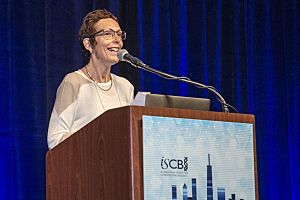Christine Orengo facts for kids
Quick facts for kids
Christine Orengo
|
|
|---|---|

Christine Orengo in speaking at the Intelligent Systems for Molecular Biology (ISMB) conference in Chicago in 2018
|
|
| Born |
Christine Anne Orengo
22 June 1955 |
| Alma mater |
|
| Known for |
|
| Awards | EMBO Membership (2014) |
| Scientific career | |
| Fields |
|
| Institutions |
|
| Thesis | A study of the redox properties of haem in proteins and model systems (1984) |
| Doctoral students | Camilla Pang |
Christine Anne Orengo is a brilliant scientist and a Professor of Bioinformatics at University College London (UCL). She is famous for her important work on protein structure, especially for creating the CATH database. From 2021 to 2024, Professor Orengo was the president of the International Society for Computational Biology (ISCB). She was the first woman ever to hold this important position!
Contents
Christine Orengo's Education Journey
Professor Orengo started her amazing journey in science by studying Chemical Physics at the University of Bristol. She earned her first degree, a Bachelor of Science, in 1976.
Advanced Studies in Science
She then went on to the University of Aberdeen. There, she earned a Master of Science degree in Medical Physics in 1977. Her research focused on how iron metabolism was affected in laboratory rats. Later, in 1984, she earned her highest degree, a PhD, from UCL. Her PhD research looked at how haem (a part of blood) works in proteins.
Career and Scientific Discoveries
After finishing her PhD, Professor Orengo worked in different industries. She was a Chief Chemist and also a mathematical modeller. In 1987, she started working as a postdoctoral researcher at the National Institute for Medical Research (NIMR). A postdoctoral researcher is someone who does advanced research after getting their PhD.
Joining University College London
In 1995, she joined the biochemistry and molecular biology department at UCL. She received a special fellowship from the Medical Research Council (MRC) to continue her work in Bioinformatics. By 2002, she became a full Professor of Bioinformatics.
Understanding Proteins with Computers
Professor Orengo's research uses computer methods to study genes and proteins. She helps to group proteins into families based on how they evolved. This helps scientists understand what different proteins do and how they work in living things. Her work has been supported by important groups like the Medical Research Council and the Biotechnology and Biological Sciences Research Council (BBSRC).
Important Publications and Students
Professor Orengo has also co-edited a textbook called Bioinformatics: Genes, Proteins and Computers. Her most important research papers have been published in well-known science journals like Nature and Nucleic Acids Research. She has also guided many students who went on to become successful scientists, including Camilla Pang.
Awards and Special Recognition
Professor Orengo has received many honors for her contributions to science.
- In 2014, she was chosen as a member of the European Molecular Biology Organization (EMBO).
- In 2019, she became a Fellow of the Royal Society (FRS). This is a very high honor for scientists in the United Kingdom.
 | Emma Amos |
 | Edward Mitchell Bannister |
 | Larry D. Alexander |
 | Ernie Barnes |

